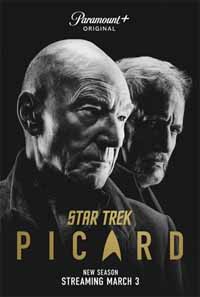 © CBS, Paramount
© CBS, Paramount
I'm not going to wait till the end of the review this time to say this. I want to get it out of the way right up front. Paramount needs to get some actual science fiction writers (preferably ones who have worked on Star Trek in the past) and science and technical consultants into the writing rooms for their Star Trek shows. And furthermore, the TV writers in the room need to listen to those sci-fi writers and consultants. Not only does the second season of Star Trek: Picard fall apart due to sloppy, incoherent plotting, but it also seems painfully unaware of certain parts of Trek canon and also of how metaphor and allegory are supposed to work.
I previously wrote an outline of my ideas for re-writing the first season of Picard to retain all the good ideas, get rid of the bad, and create something that more closely resembles the type of Star Trek that I want to see. But I don't think I can do that for this season of Picard because nothing in this show makes any sense.
I was actually kind of optimistic at the start. The first 2 episodes were actually not bad, and seemed to go out of their way to try to rectify some of the complaints that were levied against season 1. This time around, the Federation is not depicted as racist cowards who are unwilling to help a refugee population fleeing from a natural catastrophe. In fact, they give long speeches about the duty of Starfleet to explore the unknown and about the value of diversity and inclusion. We still see a version of the Federation that is racist and xenophobic, but this time, it's in the form of a parallel reality fascist Confederation. The first episode is even about a starship investigating a strange anomaly in space. This is an OK start. This actually kind of sort of looks like Star Trek.
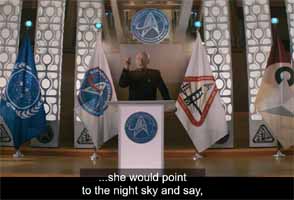 © CBS, Paramount
© CBS, Paramount
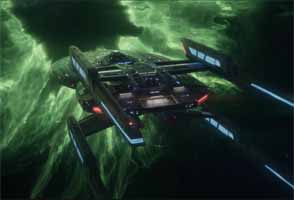 © CBS, Paramount
© CBS, Paramount
Season 2 starts off promising, with the Federation looking more like what I'm used to,
and the opening episode seemingly including an "anomaly of the week".
Problematic developments
But even from this first episode, the cracks in the storytelling are already exposed. Problem number one is that all the important character development happened off-screen between seasons. Rios apparently got over his trauma, went back to Starfleet, and was given a captaincy. He even broke up with Jurati. Good riddance. Seven and Raffi also had a relationship and then a falling-out -- all off-screen. Raffi developed some sort of proxy-parent / mentor relationship with Elnor, who also joined Starfleet, and is somehow already on a deep space assignment less than a year after enlisting. Meanwhile, Larin's husband died, and she's secretly fallen madly in love with Picard, who is now an instructor or headmaster at Starfleet Academy. Soji is an ambassador between the synths and the Federation and isn't involved in season 2 at all, despite having been the lynchpin of the first season.
The character development that happens during season 2 isn't any better. This season Fundamentally changes Picard's character. He was already unrecognizable as the same Jean-Luc Picard from The Next Generation in season 1, but I'm willing to give a pass due to the decades of time in between. People change over decades, especially if their life circumstances have also dramatically changed. Picard went from being a Starfleet captain exploring the galaxy, to sitting around his chateau with his Romulan not-slaves, sipping wine and petting dogs. Fine, I get that he's mellowed since the end of TNG.
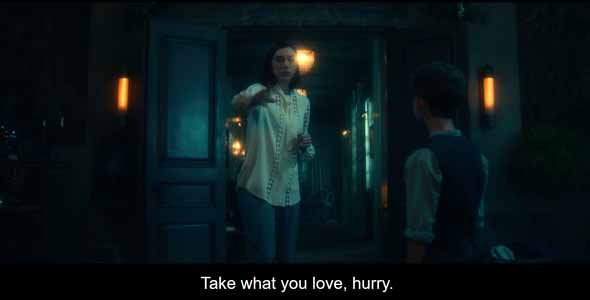 © CBS, Paramount
© CBS, Paramount
Picard's past is ret-conned to include a mentally ill mother and toxic home environment
being the reason he left home for the stars.
But season 2 actually goes back and retcons Picard's entire life in ways that reframe his entire character from TNG. He isn't the consummate explorer who joined Starfleet because of a genuine love of science and discovery. Now, he joined Starfleet to get away from a toxic home environment. It's just like how reboot James Kirk didn't join Starfleet because of a desire to explore, but because he was double-dog-dared to be a better Starfleet officer than his dead dad. But at least in Kirk's case, that is a different character in a different timeline. In Picard's case, we're supposed to believe this is the same Picard that we've known all along.
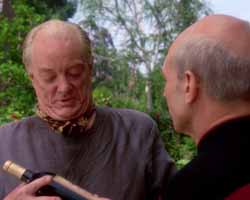 TNG s4 e2 "Family", © CBS, Paramount
TNG s4 e2 "Family", © CBS, Paramount
Where was Robert during all this family drama?
Also, did the writers not know that Picard had an older brother? Where was Robert Picard during all this drama with their parents?
And Seven of Nine has apparently regressed from any of her character development from the previous season, as she's back to mindlessly killing Borg and insisting that they "aren't human anymore". This is despite the fact that both she and Picard are case in point examples of former Borg being rehabilitated, and despite her sorrow of the destruction of the Borg Rehabilitation Project in season 1.
The lynchpin of this season is a young astronaut who suffers from crippling depression. This is despite the fact that NASA has pretty extensive screening and training processes that would either rule out someone who is not emotionally stable enough to do the job, or would train them to the point that they do the job without a second thought. This is an example of how having science and technology consultants in the writing room would help make the story more believable.
[More]